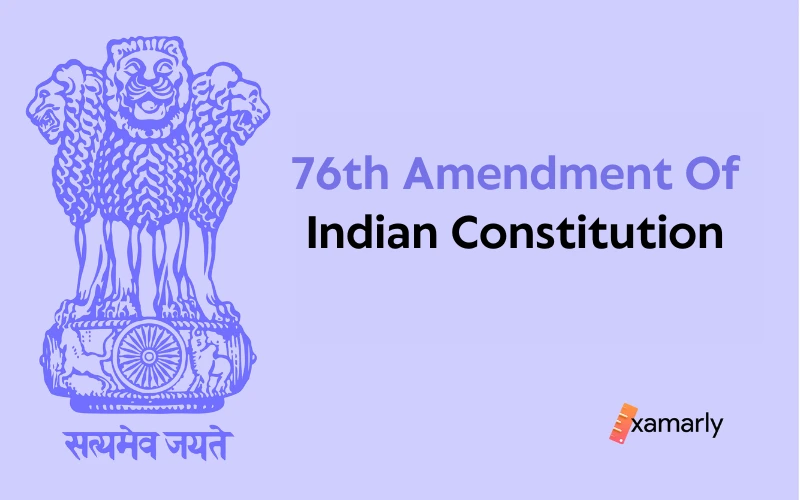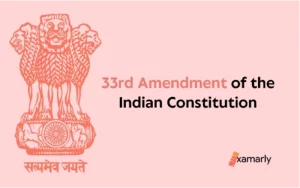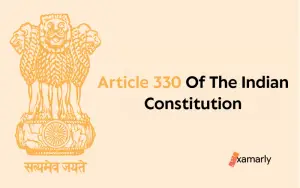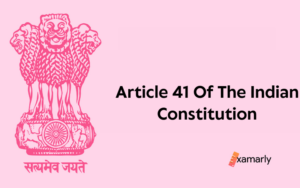The Constitution (Seventy-Sixth Amendment) Act, 1994 is the formal name of the 76th Amendment of the Indian Constitution. This amendment allows the continuation of the 69% reservation in Tamil Nadu by adding the relevant Tamil Nadu Act to the Constitution’s 9th Schedule.
This article will assist you in your UPSC exam by providing information about the 76th Amendment of the Indian Constitution.
- 76th Amendment of the Indian Constitution
- Objects and Reasons
- Important Provision
- Conclusion
- FAQs on the 76th Amendment of the Indian Constitution
- Which amendments to the Constitution placed the Tamil Nadu Reservation Act of 1994 under the 9th Schedule to shield it from judicial review?
- What is the ninth schedule of the Indian Constitution?
- Why was the Tamil Nadu Reservation Act included in the Ninth Schedule?
- When the seventy-sixth amendment came into effect?
- How to remember the 76th amendment of the Indian Constitution?
76th Amendment of the Indian Constitution
On 31 August 1994, the 76th amendment of the Indian Constitution came into effect. This amendment was enacted in the Forty-fifth year of the Republic of India. Parliament enacted it. This modification amends schedule 9 of the Indian Constitution.
Main points:
- The Tamil Nadu Reservation Act of 1994, which mandates 69 percent of seats in educational institutions and positions in state services, is listed in the Ninth Schedule to protect it from judicial review.
- The supreme court declared in 1992 that the overall percentage of reservations should not be higher than 50%.
Objects and Reasons
The Constitution (Eighty-Fifth Amendment) Bill of 1994, which became the Constitution (Seventy-Sixth Amendment) Act of 1994, had a statement of purposes and justifications attached to it.
- Tamil Nadu has been implementing a “policy of reservation” for almost a century, wherein individuals belonging to the Backward Classes, Scheduled Castes, and Scheduled Tribes are granted certain benefits. This policy covers reservation of appointments to posts in the public services and “reservation” of seats in educational institutions. The State Government periodically expands the extent of reservation in accordance with the demands of the vast majority of the populace. Currently, it stands at 69 percent. Scheduled Castes make up 18% of the population, Scheduled Tribes 1%, and Other Backward Classes 50%.
- On November 16, 1992, the Supreme Court issued its decision in Indira Sawhney and others v. Union of India and others (AIR 1993 SC 477). Adding that the maximum proportion of reservations under article 16(4) shall not exceed 50%.
- A writ petition was submitted to the Madras High Court. This brought up the issue of admission to institutes of higher learning for the academic year 1993–1994.
The High Court of Madras ruled that for that academic year, the Tamil Nadu government could maintain its previous reservation policy. However, the quantum of reservations should be reduced to 50% during the 1994-95 academic year.
To challenge the Madras High Court, the government of Tamil Nadu filed a Special Leave Petition. This was done in order to ensure that the State Government’s current reservation policy is upheld in order to maintain the progress of the Backward Classes. However, the Supreme Court of India’s interim ruling states that the reservation shall not exceed 50% when it comes to the matter of admission to educational institutions. - On November 9th, 1993, the Tamil Nadu Legislative Assembly held a special session. In that, it had been absolutely decided to request the Central Government take immediate action to submit a suitable amendment to the Indian Constitution. This was done to enable the Tamil Nadu government to maintain its current 69% reservation policy for enrollment in educational institutions and government services. On November 26, 1993, an all-parties meeting was convened in Tamil Nadu, with the goal of guaranteeing that the 69% reservation policy would continue in place for the benefit and advancement of the underprivileged.
- The Tamil Nadu Backward Classes, Scheduled Castes and Scheduled Tribes (Reservation of Seats in Educational Institutions and of Appointments or Posts in the Services Under the State) Bill, 1993, was adopted by the Tamil Nadu government. This bill was passed to the Indian government for consideration by the Indian President in line with article 31C of the Indian Constitution.
- The Union Home Minister met with the heads of Political Parties on July 13, 1994. The meeting was held to address the contents of the Bill because of the significance and sensitive nature of the situation. The Bill should be ratified, according to the leaders’ general agreement. As a result, on July 19, 1994, the President approved the Bill.
- Accordingly, on July 19, 1994, the Tamil Nadu government put in the picture the Tamil Nadu Backward Classes, Schedule Castes, and Scheduled Tribes (Reservation of Seats in Educational Institutions and of Appointment or Posts in the Services Under the State) Act 1993 that it would become Act No. 45 of 1994.
- On July 22, 1994, the government of Tamil Nadu asked the Indian government to add the aforesaid Tamil Nadu Act 45 of 1994 to the Constitution of India’s Ninth Schedule for the following reasons:
- Article 31C of the Indian Constitution is invoked by the aforementioned Act as it is under the purview of clauses (b) and (c) of article 39, as well as articles 38 and 46 of the Constitution-vide section 2 of the Act.
- The directive Principles of State Policy outlined in Part IV of the Constitution, specifically Article 38, clause b, and clause c of Article 39 and Article 46, have been used as the framework for passing the Act.
- The Act will be protected by the terms of article 31C of the Constitution because it is intended to implement the directive principles of State Policy, including those found, among other places, in articles 39(b) and (c).
- As a result, the Act cannot be contested under articles 14 or 19 of the Constitution, with respect to which article 14’s prohibition on reservations greater than 50% was overturned by the Supreme Court.
- The decision has been made to address the Indian government. The primary motivation behind this was to ask that the Act be incorporated into the Ninth Schedule of the Constitution so that it would get protection under Article 31B. Furthermore, it cannot be argued that it violates any of the essential rights listed in Part III of the Constitution, involving articles 15 and 16.
- The State legislation’s provision has already been backed by the Indian Government as evidenced by the President’s assent to the Tamil Nadu Bill. Consequently, it is imperative that the Tamil Nadu Act 45 of 1994 is included in the Ninth Schedule of the Constitution to ensure its protection under Article 31B, which precludes judicial review.
- The Bill aims to accomplish the aforementioned objective.
Relatable articles:
Important Provision
Amendment of the Ninth Schedule- The entry that comes following entry 257 and prior to the explanation in the Constitution’s ninth schedule is as follows:
“257A. The Tamil Nadu Backward Classes, Scheduled Castes and Scheduled Tribes (Reservation of Seats in Educational Institutions and of Appointments or Posts in the Services Under the State) Act, 1993 (Tamil Nadu Act 45 of 1994).”
Conclusion
The 76th amendment of the Indian Constitution went into effect on 31 August 1994. This constitutional amendment modifies schedule 9 of the Indian Constitution.
It deals with reserving seats in educational institutions and appointments or posts in state-run services for members of backward classes, scheduled castes, and scheduled tribes.
On November 16, 1992, the Supreme Court of India established a ceiling of 50% on the total percentage of reservations permitted under Article 16(4) of the Constitution.
In the interest of further readings:
| Tricks To Remember Amendments Of The Indian Constitution | Schedules Of The Indian Constitution |
| Important Amendments Of The Indian Constitution | Right To Freedom Of Religion – A Fundamental Right |
FAQs on the 76th Amendment of the Indian Constitution
Which amendments to the Constitution placed the Tamil Nadu Reservation Act of 1994 under the 9th Schedule to shield it from judicial review?
The 76th amendment of the Indian Constitution added the Tamil Nadu Reservation Act of 1994 to the Ninth Schedule, safeguarding it from being subject to judicial review. The act mandates a 69 percent quota for reserved seats in state services and educational institutions.
What is the ninth schedule of the Indian Constitution?
A list of central and state legislation that cannot be challenged in court is contained in the ninth schedule of the Indian Constitution (legal challenge). There are 284 such laws in effect that are not subject to judicial review.
Why was the Tamil Nadu Reservation Act included in the Ninth Schedule?
The Tamil Nadu Reservation Act of 1994 mandated a 69% quota for reserved seats in state services and educational institutions. By including the act in the Ninth Schedule, it was protected from judicial review and could not be challenged in court.
When the seventy-sixth amendment came into effect?
76th amendment of the Indian Constitution went into force on August 31, 1994. The Republic of India’s 45th year saw the implementation of this amendment. It was enacted by Parliament. The ninth schedule of the Indian Constitution is updated by this modification.
How to remember the 76th amendment of the Indian Constitution?
The acronym to remember the 76th amendment is:
“PEN – Protection, Ninth Schedule, Education, and Tamil Nadu”
The letters in “PEN” stand for the following key points of the amendment:
Protection: The amendment added protection to the Tamil Nadu Reservation Act by placing it in the Ninth Schedule of the Constitution.
Ninth Schedule: The act was added to the Ninth Schedule, which protects it from being challenged in court.
Education and employment: The act mandates a 69 percent quota for reservation seats in educational institutions as well as for the appointments of posts in public services.
Tamil Nadu: The act applies specifically to the state of Tamil Nadu.
By remembering the acronym “PEN,” you can easily recall the important points of the Seventy-Sixth (76th) Amendment Act.






